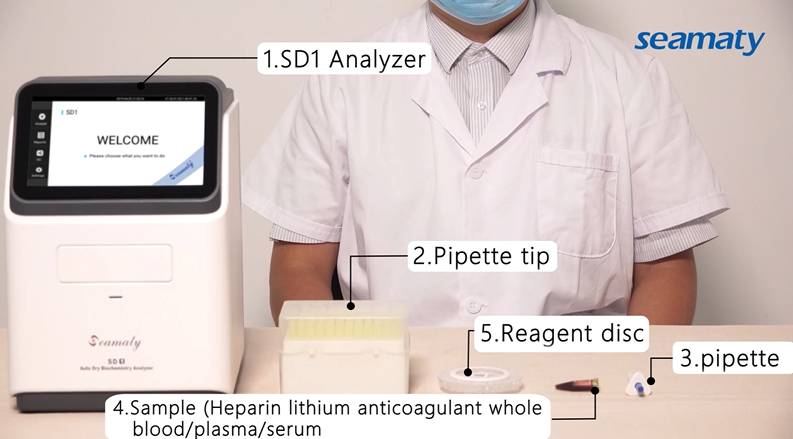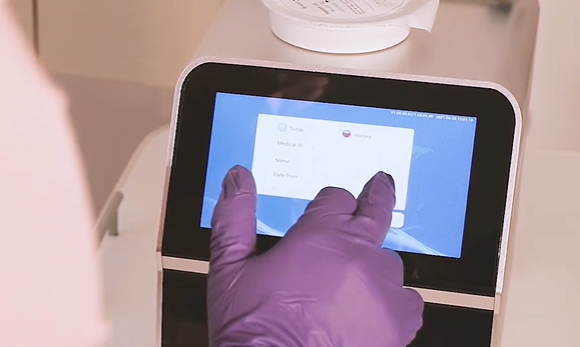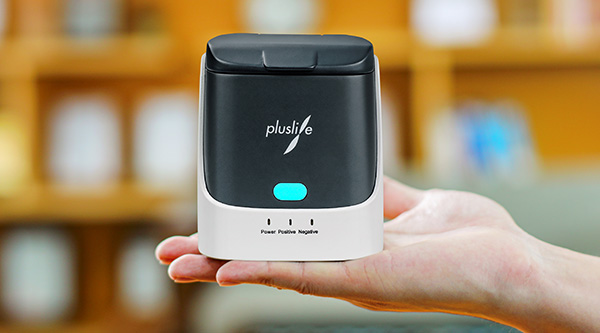Analyzers that measure biochemistry are a subset of clinical chemistry analyzers, are types of medical devices used in medical labs to find out how much of a given drug, protein, electrolyte, Analyzable analyzable or metabolite present in serum, plasma, urine, cerebrospinal fluid, or other body fluid samples.
They employ measurement technologies such as latex agglutination, ion-selective potentiometry, and photometric and colorimetric testing. Samples are inserted into plates or slits, and tests are programmed using bar-code scanner or keypad scanner. The analyzer might store reagents, and it might need a water source to cleanse its internal components. A screen shows the results, and frequently there are connectors for connecting to a computer or printer.
Different structures can be found in chemistry analyzers. The majority of clinical chemistry analyzers are built as tabletop or cart-mounted devices. There are bedside variants that are smaller and have fewer test options. Other chemistry analyzer types require a flat surface to be used. To test for analytes including proteins, enzymes, and electrolytes, from modest point-of-care clinics to high-throughput clinical laboratories, chemical analyzers are used in laboratories of all sizes.
The sample, reagent addition, combining, heating process, detection, outcome computation and presentation, cleansing are all automated during the analysis process. It is practical to use because of the high level of automation and the capabilities of automated correction and calibration, as well as the fact that subjective errors and system faults are typically small.
Applications of Chemistry Analyzers
Tests for metabolic processes or cardiac indicators, monitoring disorders like diabetes, and drug misuse testing are a few examples of applications. The most popular type is a benchtop analyzer, but there are also compact bedside variants that often have fewer test possibilities and high-throughput floor-based machines available.
Types of Chemistry Analyzers
The following are examples of various chemistry analyzer types:
• Automated Chemistry Analyzer
• Benchtop Chemistry Analyzer
• Handheld Narcotics Analyzer
• Random Access Chemistry Analyzer
• Integrated Chemistry System
• Clinical Chemistry System
• Analyzer for Low Volume Chemistry... Differentiates a number of different analytes
Automated Chemistry Analyzer
In the medical lab, automated analyzers are used to quickly and accurately measure a wide range of chemical and other characteristics in large numbers of biological samples with minimal or no human intervention. The ability to measure blood and other fluid properties could improve medical diagnosis.
Photometry is commonly used to quantify analyte concentrations in samples. This technique demonstrates that a chemical reaction has taken place, as evidenced by a change in colour, in the sample. The concentration of the analyte is then roughly estimated by measuring the sample's absorbance using a photometer.
The following instruments are typical of Seamaty chemistry analyzer
SD1 Chemistry Analyzer
Seamaty SD1 biochemistry analyzer, that is equipped with the latest technology, is the state-of-the-art automatic SD1 biochemical analyzer. It is a fully automated chemistry analyzer designed for the on-site testing.
Advantages of SD1 biochemistry analyzer:
It can provide medical diagnosis that are:
• more accurate
• easier
• faster
• using 0.1cc of whole blood, serum or plasma
• Utilizing cloud computing, SD1 can help the operators to make medical decisions remotely
• The test results will be automatically printed after 12 minutes
• The analyzer helps operators automatically monitor conditions inside the machine
SMT680 Immunoassay Analyzer:
Portable and fully automated, the Seamaty SMT680 is an immunoassay system. It is based on the principles of chemiluminescence immunoassay (CLIA) and uses microcapillary technology and antibody labelling technology to facilitate rapid and straightforward laboratory testing.
Labs with medium to high throughput can save money and improve efficiency by using a clinical chemistry analyzer. It's simple to implement, and reliable test results can be retrieved quickly. More than 30 parameters related to thyroid health, inflammation, hormones, and infectious disease diagnosis can now be measured from a single blood draw.
FEATURES:
• sample tracking
• Analyzing patient information
• Customized dining options
• Different colours serve as alerts, indicating the system's status.
• Instructional videos can be found online to help with repairs and replacements.
• High-precision micro sampling provides accurate and precise results
SMT-120 Chemistry Analyzer
The Seamaty SMT-120 chemistry analyzer is an automated system ideal for on-site testing. The liver, kidneys, electrolytes, heart, pancreas, blood lipids, and glucose levels can all be checked with just one device. This is a cheap choice for labs with low to moderate throughput.
This chemistry analyzer, which boasts a small footprint and intuitive interface, can complete routine clinical chemistry tests in as little as 12 minutes and return accurate results. Up to 18 different chemistry tests can be performed with its patented single-use reagent discs.
It can be put to good use in everyday life as well as in emergency situations where quick action is required, such as during medical emergencies or rescue missions. Using cloud computing, SMT-120 can help operators make critical medical decisions in real time.


